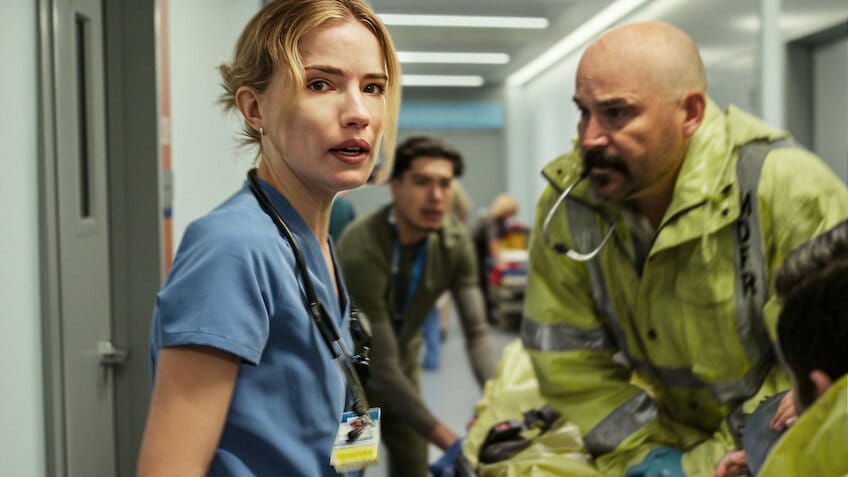The series opens with a shocking scene: a bus plunges off a bridge. The entire soccer team ends up underwater. It’s here that the Maguire emergency team, one of Florida’s best hospitals, steps in.
“Pulse” is a 10-episode series created by Zoe Robyn, who not only conceived the show but also serves as its co-showrunner and executive producer. Alongside her as co-showrunner and executive producer is Carlton Cuse, a name synonymous with high-stakes, character-driven storytelling thanks to his pivotal role in the acclaimed series “Lost.” The collaboration between a newer creative voice like Robyn’s and Cuse’s seasoned experience achieves a compelling blend of fresh ideas and practiced execution, offering viewers a unique perspective on the familiar landscape of medical dramas. Given Cuse’s background in a series celebrated for its intricate mysteries and deep character explorations, anticipation grows that “Pulse” might offer more than typical episodic medical cases, possibly weaving complex personal narratives and unexpected plot developments into the hospital setting.
The Plot
Set against the dramatic backdrop of a hurricane bearing down on Miami, “Pulse” promises a gripping narrative that intertwines the intense medical emergencies of a Level 1 trauma center with the intricate and often tumultuous personal lives of the dedicated doctors who work there. The hurricane is a distinctive element that immediately sets “Pulse” apart from many other medical dramas. It introduces an external crisis that amplifies the already tense emergency room environment, creating a crucible where both professional skills and personal relationships will be tested to the limit, as hinted at in the series’ early descriptions. The recurring emphasis on the impending storm and the hospital’s subsequent lockdown serves as the narrative axis for a complex and fraught character-driven plot.
The central plot of “Pulse” revolves around Dr. Danielle “Danny” Simms, a dedicated third-year resident at Miami’s bustling Maguire Medical Center, portrayed by the talented Willa Fitzgerald. In a turn of events that promises to ignite the drama, Danny is unexpectedly thrust into the role of chief resident following the suspension of the previously esteemed Dr. Xander Phillips, played by Colin Woodell, after a colleague files a report. This sudden change in leadership due to a suspension immediately introduces conflict into the narrative, raising questions about the circumstances surrounding Xander’s removal and hinting at potential power struggles within the hospital hierarchy. Xander’s description as “beloved” further suggests that his suspension might be controversial or viewed differently by various members of the hospital staff.
Adding another layer of intrigue and complexity to the already tense situation, it’s revealed that Danny and Xander share a secret and illicit romantic history. This hidden relationship begins to unravel as the pair is forced to confront the escalating medical crisis brought on by the hurricane and the hospital’s subsequent lockdown. The forbidden romance trope is a familiar element in medical dramas, often serving to heighten emotions within the professional setting. The fact that their relationship comes to light amidst a major crisis will likely amplify the drama and create even more complications for both Danny and Xander, as well as their colleagues. The description of their romance as “illicit” and the promise of “explosive details” emerging suggests that this relationship is not only secret but also carries significant professional or ethical implications that will likely be a major source of conflict throughout the series.
Beyond the central romantic entanglement, the plot of “Pulse” emphasizes the delicate balance between the high-stakes medical cases brought on by the impending hurricane and the personal and professional challenges faced by the entire team of doctors and ER staff. The series will explore how the fallout from Danny and Xander’s complicated relationship affects the workplace and the lives of the other medical professionals at Maguire Medical Center. The hurricane serves not only as a dramatic backdrop but also as a catalyst, intensifying both the medical emergencies and the interpersonal crises within the hospital. The personal lives of Danny and Xander are not isolated incidents but have a ripple effect throughout the hospital dynamic, suggesting the potential for compelling subplots and rich ensemble character development.

The Cast
“Pulse” boasts a talented cast that promises to bring these complex characters to life. Leading the way is Willa Fitzgerald in the role of Dr. Danielle “Danny” Simms. Fitzgerald’s recent appearances in popular series such as “Reacher” and “The Fall of the House of Usher” have earned her recognition and will likely draw in viewers familiar with her previous work. Her experience in these varied roles suggests a versatility that could be crucial in portraying the emotional and professional challenges Danny will face.
Alongside Fitzgerald is Colin Woodell as Dr. Xander Phillips. Woodell’s prior roles in series with thriller and action elements, such as “The Flight Attendant” and “The Continental: From the World of John Wick,” and his experience in “The Originals” indicate his adeptness at intricate, character-driven narratives. Justina Machado, who plays Natalie Cruz, the formidable chair of Surgery and Emergency Medicine, adds further depth to the cast. Machado, known for her roles in “Queen of the South” and “One Day at a Time,” brings gravitas and experience to the ensemble. She will likely portray a strong and authoritative figure within the hospital administration who plays a crucial role in managing the ongoing crisis and the repercussions of Danny and Xander’s relationship. Her previous roles often showcase her ability to portray both strength and compassion, qualities that would fit well in the role of the chair of surgery.
The talented supporting cast includes:
- Jack Bannon (“Pennyworth,” “Endeavour”) as Tom Cole, a surgery resident. Bannon’s background in period dramas could bring a unique element to the ensemble, and his character’s role as a surgery resident suggests potential storylines that extend beyond the immediate chaos of the ER.
- Jessie T. Usher (“The Boys,” “Tales from the Hood 3”) as Sam Elijah, a third-year Emergency Medicine resident and Danny’s close friend. Usher’s role in the popular superhero series “The Boys” provides him with significant recognition, and his character’s close bond with Danny suggests he will be a key source of support for her amidst the turmoil.
- Daniela Nieves (“Vampire Academy,” “Snowfall”) as Camila Perez, a third-year medical student. Nieves’ experience in young adult and dramatic series could appeal to a younger demographic of viewers.
- Chelsea Muirhead (“Warrior,” “Vampire Academy”) as Sophie Chan, a surgical intern. Muirhead’s experience in action series like Warrior might suggest a determined and resilient personality for her character.
- Jessy Yates (“Law & Order: SVU”) as Harper Simms, a second-year Emergency Medicine resident and Danny’s younger sister. The sibling dynamic between Harper and Danny adds another layer of personal drama and potential conflict within the high-pressure hospital environment.
- Néstor Carbonell (“Lost,” “Bates Motel”) as Dr. Ruben Soriano. Carbonell’s previous collaborations with Carlton Cuse on Lost and Bates Motel suggest a strong working relationship and could hint at a significant and potentially complex role for him in “Pulse.”
- Jessica Rothe (“Happy Death Day,” “Valley Girl”) as Cass Himmelstein, an ER nurse. Rothe’s experience in both the horror-comedy genre and musicals indicates a versatility that could bring an interesting dynamic to her role as an experienced nurse in the chaotic emergency department.
The Series Creators
Behind the intense drama and captivating characters is a talented creative team. Zoe Robyn, the creator of “Pulse,” brings her experience in writing procedural dramas like “Hawaii Five-0” and “The Equalizer” to this new venture. Her expertise in episodic storytelling and balancing multiple character arcs is essential for the success of a medical drama. Furthermore, her work on crime-solving series suggests a knack for building suspense and resolving complex situations, skills that will undoubtedly be valuable in the high-stakes environment of an emergency room.
Co-writer and executive producer Carlton Cuse brings his extensive experience to “Pulse.” His impressive resume includes iconic series such as “Lost,” “Colony,” “Bates Motel,” “Locke & Key,” and “Tom Clancy’s Jack Ryan.” Cuse’s involvement brings a wealth of expertise in managing large ensembles, crafting intricate plots, and building suspense—all crucial elements for the potential success of “Pulse.” His background in genre television, particularly with “Lost” and “Bates Motel,” might also indicate a willingness to explore darker or less conventional storylines within the medical drama framework. Notably, his work on “Lost” is celebrated for its use of flashbacks and interwoven character narratives, a technique that appears to be employed in “Pulse” as well.
The first two episodes of “Pulse” were directed by Kate Dennis, who also serves as an executive producer on the series. Dennis has previously directed episodes of critically acclaimed dramas such as “The Handmaid’s Tale” and medical series like “New Amsterdam.” Her experience in both high-quality dramas and the medical genre suggests she is well-suited to establish the tone and visual style of “Pulse,” effectively balancing the intense medical scenarios with the intricate interpersonal drama.
Another “Grey’s Anatomy”?
Categorized as a medical drama, “Pulse” has already drawn comparisons to the popular series “Grey’s Anatomy.” This comparison is a potent marketing tool, leveraging the established fan base and appeal of “Grey’s Anatomy” to attract viewers to “Pulse.” However, the creators have also emphasized that while they acknowledge “Grey’s Anatomy’s” impact on the genre, “Pulse” aims to forge its own identity. While both shows are set in the high-pressure environment of a hospital and focus on the intertwined personal and professional lives of doctors, “Pulse” introduces the distinctive elements of a major hurricane and a central illicit romance from the outset, which could differentiate it from earlier seasons of “Grey’s Anatomy.”
Some sources have also drawn parallels to “Scandal,” the popular Shonda Rhimes series. This comparison isn’t without merit: it shares creative and rhythmic elements, constant surprises, highlighting its anticipated blend of high-stakes medical emergencies and intricate, often complicated relationships, including a workplace romance with significant power dynamics at play. The exploration of power dynamics within the central relationship also hints at the potential for complex moral and ethical dilemmas to be explored throughout the series. The creators have explicitly stated their intention to delve into the “morally gray area” of the central relationship and examine the “pitfalls” as well as the “moments of joy” of such a dynamic.
Furthermore, the creators have emphasized their desire to portray the characters of “Pulse” as “real people” who face relatable problems, rather than idealized medical “superheroes.” This approach suggests a focus on the characters’ flaws and personal struggles, aiming to offer a more realistic and authentic representation of the pressures and realities faced by medical professionals in a high-stakes setting.
Our Take
There were high expectations for a series that, in the end, settles for being just another medical drama: their lives, their passions, and the daily grind in the ER. “Pulse” comes across, in parts, as a combination of elements we’ve seen a thousand times before, which, when put together, give the impression of a series we’ve already watched with characters that feel so familiar and with surprises that cease to be surprises because the series seems too directed, ultimately feeling unnatural. “Pulse” seeks constant surprise, challenge, and to keep the viewer glued to their seat: without quite becoming a medical thriller, it wants to behave rhythmically and narratively like one without achieving the necessary strength in its characters for that purpose. You know, one of those series that tries to please everyone and ends up, ultimately, being so familiar that it ends up pleasing almost no one. It has an appealing structure, in the form of constant flashbacks that, however, don’t achieve the impact that was intended.
Where to Watch “Pulse”










